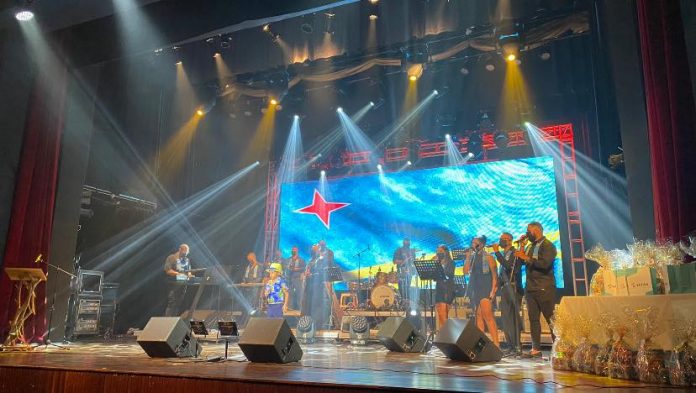Dande Festival, a cultural year-end tradition in Aruba, will take place next week. Commission for the Celebration of National Days of the Department of Culture said they are glad to be able to promote the festival this year.
The Dande is a local oral tradition where the song “ay nobe” (aña nobo) – “new year” is performed as the New Year is approaching or has arrived. Dande stems from the word Dandalia, which loosely translates into “to party, he who parties, or simply paranda”. The first sentence of the Dande song “oh dande nos a jega na bo porta” – Ay Nobe, translated means “Oh the party has arrived at your door” – New Year. The origin of the Dande is not known, however there are many theories such as; 1. It started in the district of Savaneta, 2. I It started in the district of Noord, 3. Its popularity strengthened in the district of St. Cruz, or 4. It started after the abolition of slavery in 1863 by the Dutch King.
A group of five or sometimes even six people (one singer accompanied by numerous musicians) usually performs the most known Aruban end of the year tradition. These people, usually family members accompany a singer and travel door-to-door to express their best wishes for the New Year in repetitive phrases (blessings), with a chorus that includes the phrase “ay nobe” (aña nobo) – “new year” – sung after each blessing. Currently, the celebratory travel usually leads to the houses of the singers’ friends and family, where the singer collects money in his hat to give to the group. To read more, please visit https://www.arubatoday.com/culture-for-christmas.
This year, the festival will take place on December 27-29. The Commission informed that for the first time, UNOCA will be part of this celebration together with the Commission in order to elevate the festival of Dande.
Lyonel Dirks said that after they sat together with all three organizers, being Chico Harms Foundation, Children and Youth Festival Commission, and Big Adult Festival – which are celebrating 50 years of their festival – they reached the conclusion to put all these festivals together, but on different dates; this to give the Aruban community time to celebrate each festival with its different concept while remaining within the Dande tradition. On the 27th the festival will be at the Centro di Bario Brazil organized by the Chico Harms Foundation. Chico Harms, who was present at the press conference, mentioned he is very happy that this year UNOCA and the Commission for the Celebration of National Days came together to make these activities as big as possible.
Regarding their show, Harms said that because of the Covid-19 pandemic, this is the 53rd edition of the festival. They began at Colegio Cristo Rey and after the opening of sede di bario Brazil, they moved there. This year there will be 17 groups taking part. “We have to also do it for children in Tanki Leendert and we have to see how we’re going to do it next year. We cannot let this slip at any moment, this is ours and we must carry on”, Harms said.
The festival at Centro di Bario Brazil will begin at 6:30 seeing as 17 is a large amount of groups. They expect to finish around 12-1am.
Aaron Arenas of the Commission to Promote Culture said that on the 28th of December the festival will take place at the Centro di Bario Tanki Leendert for children and youth. There will be a total of 20 participants in the categories of 4-6 years, 7-9 years, 10-12 years and 13 to 17 years old. Each category will crown a king or queen. This will be the fourth winner, and each category will have either two or three places.
The youth festival will begin at 7pm with 7 groups, and they expect it will finish around 11pm-12am.
Finally on the 29th of December the festival for adults will take place, celebrating 50 years in Club Caquetio. This will begin at 6:30am.
Director of UNOCA, Ray-anne Hernandez said that this year they decided to partner with the Commission for the Celebration of National Days, Department of Culture and Ministry of Culture so that together they can elevate the Dande festivals in Aruba.
The idea behind this is for each of the three festivals can receive more support than they usually do. “We realized that each year it becomes a challenge for each organization to keep on their own standard at the level expected by the Aruban community regarding show and presentation, but also regarding organization and logistics. This was a very important reason for us to support these festivals, to maintain the level and to continue maintaining our Dande tradition,” Hernandez said.




















